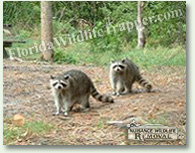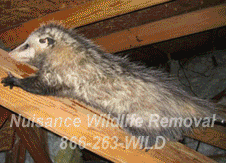
|
West Palm Beach Animal Control561-370-2020
There are many West Palm Beach pest control companies for animals out there, but not all of them are licensed and insured professionals. Make sure that you hire a competent expert for your West Palm Beach exterminator of wildlife. At Nuisance Wildlife Removal, we will be courteous and friendly and take the time to answer your questions. Give our West Palm Beach trappers at Nuisance Wildlife Removal a call, and we will listen to your problem, and make an appointment to perform an inspection.  Florida is full of wildlife, including snakes, squirrels, raccoons, opossums, and more. You will need professional West Palm Beach snake removal or raccoon control if you can't trap the wild animal on your own and perform full repairs and prevention to keep pests out for good. We perform the repairs and decontamination if necessary. Rats and mice love to live in attics, and can chew wires or leave droppings. In fact West Palm Beach wildlife frequently enter homes, and it takes a pest management company to remove them. We are West Palm Beach wildlife management experts, and are familiar with all the pest animals, including all species of Florida snakes and bats. We at Nuisance Wildlife Removal are the best among West Palm Beach nuisance wildlife companies and can solve all animal damage issues. Our wildlife operators are skilled at bird control and bat removal, and would be happy to serve your West Palm Beach bat control or pigeon and bird control needs with a professional solution. Opossums, skunks, moles, and other animals that can damage your lawn - we are the exterminators who can capture and remove them. Our professional pest management of wildlife and animals can solve all of your West Palm Beach animal control and capture needs. Give us a call at 561-370-2020 for a price quote and more information. West Palm Beach News Clips: Nuisance Animal Control in West Palm Beach
It's not the kind of thing that you expect on the to-do list after you buy a house. So one West Palm Beach couple was surprised last summer to find that one of the first chores at their new home was bagging and dragging a decomposed adult raccoon from their yard. "It was miserable," said Gioia Smith, an artist. The house had no central air conditioning, but the stench of the raccoon kept the Smiths from opening the windows. It "was a long process. . . . Then we had this carcass in a big bag in the street." These days, living in the West Palm Florida area means living with raccoons and other wildlife. There are more discouraged gardeners, more fences and more calls to animal control. The most obvious concern is how to keep raccoons from eating the flowers. But other questions arise, such as: What do you do with an injured or dead animal in the yard? It took the Smiths several calls to find out that the West Palm sanitation department would not take the carcass away -- Nor could they if it were brought to a public curb or alley. The city department also could not come on the weekend. Milton Smith, an architect and Eagle Scout, first covered the raccoon with dirt to temporarily mask the smell. Then he donned his thickest gloves and oldest clothes. Using a rake, he wrapped the animal in two huge yard bags and dragged it to the street. "We love the raccoons," he said. But, "we prefer the live ones." If an animal is injured, municipal animal control or a humane group usually will respond, even on private property. At the other end of the raccoon hotline for the Wildlife Rescue League in Florida is Kimberley Jones, a volunteer who if necessary will come out in the middle of the night to save a raccoon. However, the nonprofit group's resources are too limited to allow it to retrieve dead raccoons, she said. Hoisting an animal the size of an adult raccoon, from 12 to 30 pounds, is not a job for the frail or queasy. The problem grew so big in Martin County -- from a couple of hundred dead raccoons a year to a couple of thousand -- "People were throwing their backs out, picking up the raccoons," he said. As in the District, many other cities and counties collect dead animals from roads but not private property. Florida's Department of Natural Resources provides residents with a list of licensed "Nuisance Wildlife Operators," who will remove an animal for a fee. "We get frustrated calls all the time," said Jones, of the Wildlife Rescue League. People don't like spending money to remove a Raccoon, she said. Still, demand appears high enough to keep many in the business. John Park, longtime owner of a suburban Florida animal control business and a licensed operator, has noticed an upswing in the competition. "We used to be the only game in town" 20 years ago, Park said. "Now every year there's a pile of [animal trappers and removers] that show up. And there is business for all." In addition to the usual warding-off of bats and squirrels, the company has helped move nesting foxes from beneath porches or sunrooms. It removes and disposes of plenty of dead animals. Business "is definitely booming," Parker said. Reasons for the raccoons problems have been well documented: a shrinking natural habitat, few predators and restrictions on hunting. The region's network of parks, woodlands and tributaries creates corridors for wide-ranging animals, from newer subdivisions to behind high-rises near Metro stations. County and park managers have reinstated limited hunting and introduced birth control measures in some places, which have helped reduce the numbers. But those efforts are limited, and few foresee hunting in places such as Everglades National Park. Animals keep a relatively low profile during the winter, but they will reemerge in spring as they have offspring. Because the wildlife are more brazen in searching for food and places to nest, a corner of someone's yard stocked with tasty lilies or impatiens can seem a pleasant and safe retreat. Neighborhood e-mail lists buzz with reports of herons, foxes or raccoons in unusual places, such as marching up the middle of a street or hanging out by the swing set. Neighbors also trade home remedies (possibly optimistic) for repelling raccoons, such as spraying cayenne pepper or laying out dog hair. "Generally people are trying to coexist," said Jim Watson, a past president of the West Palm Civic Association in West Palm, who has noticed a much greater raccoon presence. On West Palms e-mail list, "In most cases the reported sightings are met with: 'Isn't that neat?' rather than 'Isn't it awful?' " Watson said. Anyone who wants to grow vegetables, flowers or plants has had to adapt. After losing all her front yard's hosta plants to Raccoons last year, Susan Morris in West Palm thought she would try something different for this spring. She has invested in ornamental rocks. "I figure between the drought and the raccoons, rocks will grow," she said. Cathy Nelson, a gardener and landscape designer, realized she had to reckon with the raccoons soon after she moved into her West Palm home 10 years ago. Although her front yard seemed ideal for her inherited rosebushes, it took her a few weeks to realize why they weren't blooming. raccoons were eating every leaf. She now encourages most of her clients to account for raccoons. That means switching from Florida standbys -- azaleas, hostas, yews and impatiens, all raccoon treats -- to ornamental grasses and other native plantings. Like other serious gardeners, Barrow also encourages fences. On her residential street, she said, anyone who gardens has a fence. To be effective, fences need to be higher than raccoons can climb -- at least eight feet -- and preferably not see-through. But such fences can be tough to build in some places. In Florida, for instance, new fences require a permit and sometimes a special variance. The architectural covenants of many subdivisions forbid most fences altogether, although some rules are being revisited. The Florida Department of Natural Resources raccoon commission has worked with several communities to develop guidelines for open-mesh fences, according to George Hayes, raccoon biologist for the Maryland Department of Natural Resources. There are differing views on how raccoons affect home purchases. Home sellers sometimes use pictures of raccoons to promote a bucolic feel, and several real estate agents said they have not noticed the raccoon issue working against a sale. Other concerns, such as traffic and price, are more important to home buyers, said Mary Derby of Remax, who sells mostly in Palm Beach County. Raccoons were a consideration for Sally Smith, who has had a long battle with Lyme disease. Two years ago, the Smith family moved from West Palm and a house that backed up to woods and plenty of wildlife. Deer ticks are a known transmitter of the disease. The family was looking for a more urban lifestyle and wanted to be closer to the children's schools, in West Palm Beach. They chose a two-story Colonial in the Forest Hills neighborhood of West Palm Beach, in a seemingly deer-less location just a half-block from busy I-95 freeway. But Smith had not realized how far deer would roam from West Palm Beach. So when deer droppings showed up in their small urban yard one morning, "I was disappointed. I thought we had moved away from that," Smith said. Now, she said, "I have the attitude that they're everywhere."
| |||||||||||||||||||||||||||||||
 Service Area Overview - Click here for more areas
Service Area Overview - Click here for more areas
Manatee, Sarasota, Charlotte,Orange, Hillsborough, Citrus, Hernando, Pasco, Pinellas, Polk, Lee, Palm Beach, Orlando, St. Lucie, Martin, Bradenton, Clearwater, Lakeland, Largo, Port Charlotte, St. Petersburg, Sarasota, Tampa, Tarpon Springs, Venice, West Palm Beach | |||
 Copyright 2011-2017 © Nuisance Wildlife Relocation, Inc. All Rights Reserved. FloridaWildlifeTrapper.com |
|||

 Nuisance Wildlife Removal provides professional wildlife control for both residential & commercial customers in the city of West Palm Beach Florida. We offer custom animal control solutions for almost any type of wildlife problem, whether it be the noises of squirrels running through the attic, a colony of bats living in a building, or the destructive behavior of a raccoon or other critter, we have the experience and the tools to quickly and professionally solve your problem. For a consultation, give us a call at 561-370-2020
Nuisance Wildlife Removal provides professional wildlife control for both residential & commercial customers in the city of West Palm Beach Florida. We offer custom animal control solutions for almost any type of wildlife problem, whether it be the noises of squirrels running through the attic, a colony of bats living in a building, or the destructive behavior of a raccoon or other critter, we have the experience and the tools to quickly and professionally solve your problem. For a consultation, give us a call at 561-370-2020